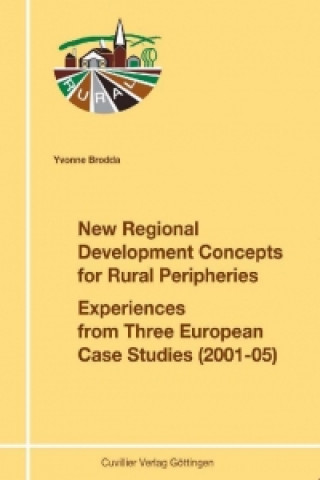
Kód: 12738550
New Regional Development Concepts for Rural Peripheries
Autor Yvonne Brodda
The framing conditions for rural areas in Europe have changed dramatically in the past thirty years. As a result, regional disparities proliferate between prospering and structurally weak areas, between innovative and stagnating r ... celý popis
- Jazyk:
 Angličtina
Angličtina - Vazba: Brožovaná
- ISBN-13: 9783869554808
Nakladatelství: Cuvillier Verlag, 2010
- Více informací o knize

Mohlo by se vám také líbit
-
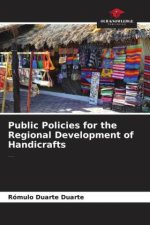
Public Policies for the Regional Development of Handicrafts
1161 Kč -
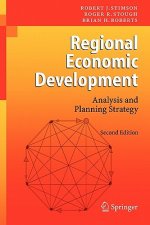
Regional Economic Development
3376 Kč -

Networks of Local Action Groups in Rural Areas - The Example of the EU Initiative Broads and Rivers LEADER+
1475 Kč -

European Cohesion Policy and European Regional Development Fund. Conditional Effectiveness and Convergence in the Solow-Model
1151 Kč -

Regional Development in the European Economic Community. --
527 Kč -

Regional and Local Economic Development
1863 Kč -

Regional Development Strategies
2108 Kč -

Skill Acquisition and Training
2403 Kč -

Brain Twister
391 Kč -
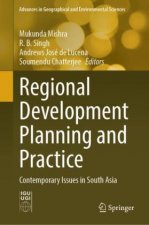
Regional Development Planning and Practice
5255 Kč -
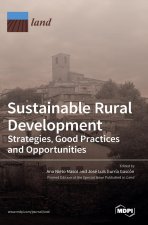
Sustainable Rural Development
1927 Kč -

Chapters In Rural Progress
392 Kč -

Zapojení ČR do mezinárodního úsilí
84 Kč -

Investice
280 Kč
Informovat o naskladnění knihy
Zadejte do formuláře e-mailovou adresu a jakmile knihu naskladníme, zašleme vám o tom zprávu. Pohlídáme vše za vás.
Více informací o knize New Regional Development Concepts for Rural Peripheries
 Anotace knihy
Anotace knihy
The framing conditions for rural areas in Europe have changed dramatically in the past thirty years. As a result, regional disparities proliferate between prospering and structurally weak areas, between innovative and stagnating regions, between centres and peripheries. This situation coincides with an increasing differentiation of rural areas, which vary considerably in their economic structure and development prospects.Changes have also occurred in policies that are relevant for rural areas. New concepts and strategies of regional policy have been the subject of much debate since the mid-1990s. First formulated at the EU-level in the "Cork Declaration" (1996), the concept of integrated rural development is particularly important. Integrated development stands for an approach based on a consistent use of endogenous potentials, a multi-sector regional and local implementation level, the participation of those affected, the development and use of network structures and partnerships, as well as the implementation of regional management and capacity building.In view of the far-reaching structural changes, the classic steering instruments of the national authorities have proven to be insufficient. Other levels appear to be more appropriate to address many of the current issues. Responsibilities of the nation state are transferred either "upstream", that is to higher-level authorities, e.g. the European Union, or "downstream" to regional and local authorities. At the same time, the relationship of public administration, economy and civil society is being reformed especially at the regional level, which can be summarised under the term of regional governance.The above sets the context for this study, which analyses new concepts, strategies and instruments in regional development policy, their implementation at the regional and local levels and finally, their relevance for the development perspectives of rural peripheries. The study rests upon three qualitative case studies, carried out in three different European regions: the Western Isles and Skye & Lochalsh (Scotland), the province Jämtland (Sweden) and the region Eisenwurzen (Austria). The detailed evaluation of the case studies, leads on to a comparative analysis of the examined national and regional and/or local concepts, as well as the employed strategies and instruments for regional development. Whilst showing many commonalities, the results reflect the heterogeneous development paths that can be identified in regional development policy in general.
 Parametry knihy
Parametry knihy
- Plný název: New Regional Development Concepts for Rural Peripheries
- Autor: Yvonne Brodda
- Jazyk:
 Angličtina
Angličtina - Vazba: Brožovaná
- EAN: 9783869554808
- ISBN: 3869554800
- ID: 12738550
- Nakladatelství: Cuvillier Verlag
- Hmotnost: 325 g
- Rozměry: 212 × 147 × 17 mm
- Datum vydání: 21. December 2010
Oblíbené z jiného soudku
-

Dune
216 Kč -

Haunting Adeline
621 Kč -

Berserk Deluxe Volume 2
1092 Kč -

White Nights
89 Kč -

Powerless
268 Kč -

Atomic Habits
330 Kč -

Dune Messiah
228 Kč -

Berserk Deluxe Volume 3
1142 Kč -

One Day
221 Kč -

Berserk Deluxe Volume 1
1115 Kč -

Iron Flame
368 Kč -

Surrounded by Idiots
213 Kč -

Harry Potter and the Prisoner of Azkaban (Minalima Edition)
993 Kč -

Gravity Falls Journal 3
443 Kč -

Heaven Official's Blessing: Tian Guan Ci Fu (Novel) Vol. 1
420 Kč -

The Creative Act
568 Kč -

Dune
276 Kč -

Hunting Adeline
624 Kč -

A Little Life
290 Kč -

Children of Dune
230 Kč -

Heaven Official's Blessing: Tian Guan Ci Fu (Novel) Vol. 2
427 Kč -

Bungo Stray Dogs, Vol. 8 (light novel)
383 Kč -

Percy Jackson and the Olympians 5 Book Paperback Boxed Set
944 Kč -

Solo Leveling, Vol. 1
440 Kč -

The Prisoner's Throne
247 Kč -

Court of Thorns and Roses
268 Kč -

Cry Baby Coloring Book
276 Kč -

Fourth Wing
407 Kč -

Icebreaker
199 Kč -

Berserk Deluxe Volume 6
1089 Kč -

Avatar, the Last Airbender: The Kyoshi Novels (Box Set)
986 Kč -

The 48 Laws of Power
601 Kč -

House of Leaves
611 Kč -

Twisted Lies
213 Kč -

Dune Messiah
272 Kč -

No Longer Human
359 Kč -

48 Laws Of Power
331 Kč -

Twisted Games
213 Kč -

Caraval Paperback Boxed Set
902 Kč -

Solo Leveling, Vol. 2
468 Kč -

Open Circuits
907 Kč -

Berserk Deluxe Volume 5
1119 Kč -

Heaven Official's Blessing: Tian Guan Ci Fu (Novel) Vol. 3
436 Kč -

Berserk Deluxe Volume 4
1125 Kč -

Court of Mist and Fury
206 Kč -

SOLO LEVELING V08
436 Kč -

English File Upper Intermediate Multipack A (4th)
531 Kč -

CHAINSAW MAN V14
254 Kč -

Before the Coffee Gets Cold
184 Kč
Osobní odběr Praha, Brno a 12903 dalších
Copyright ©2008-24 nejlevnejsi-knihy.cz Všechna práva vyhrazenaSoukromíCookies



 Vrácení do měsíce
Vrácení do měsíce 571 999 099 (8-15.30h)
571 999 099 (8-15.30h)